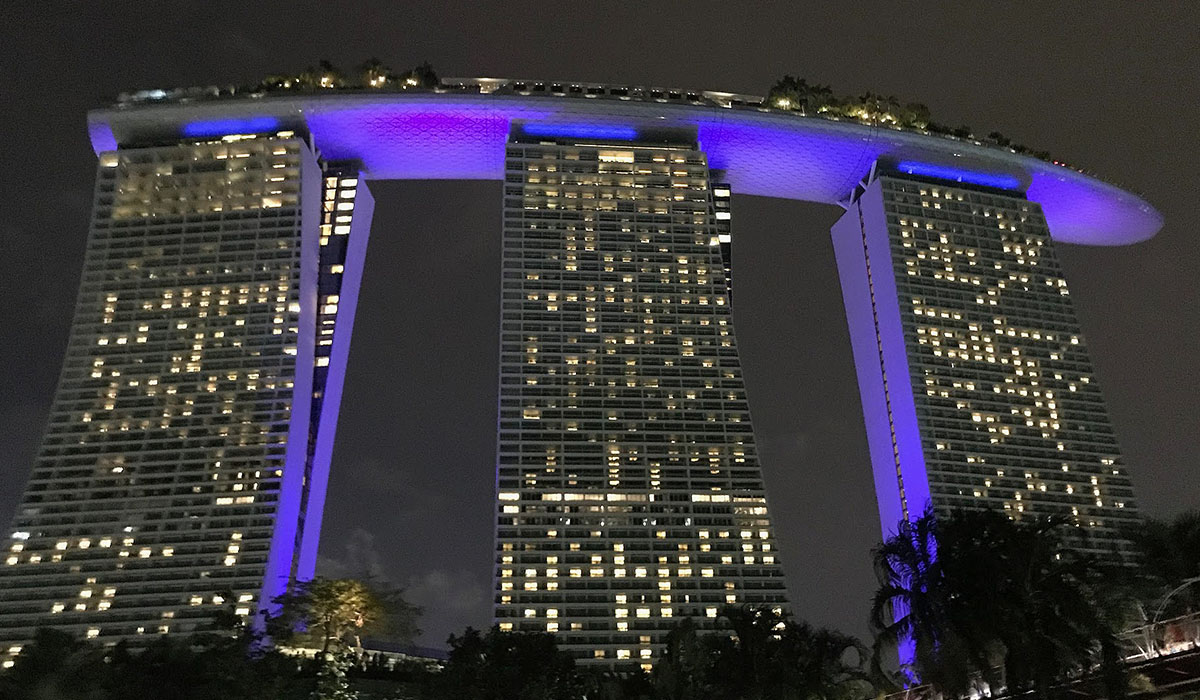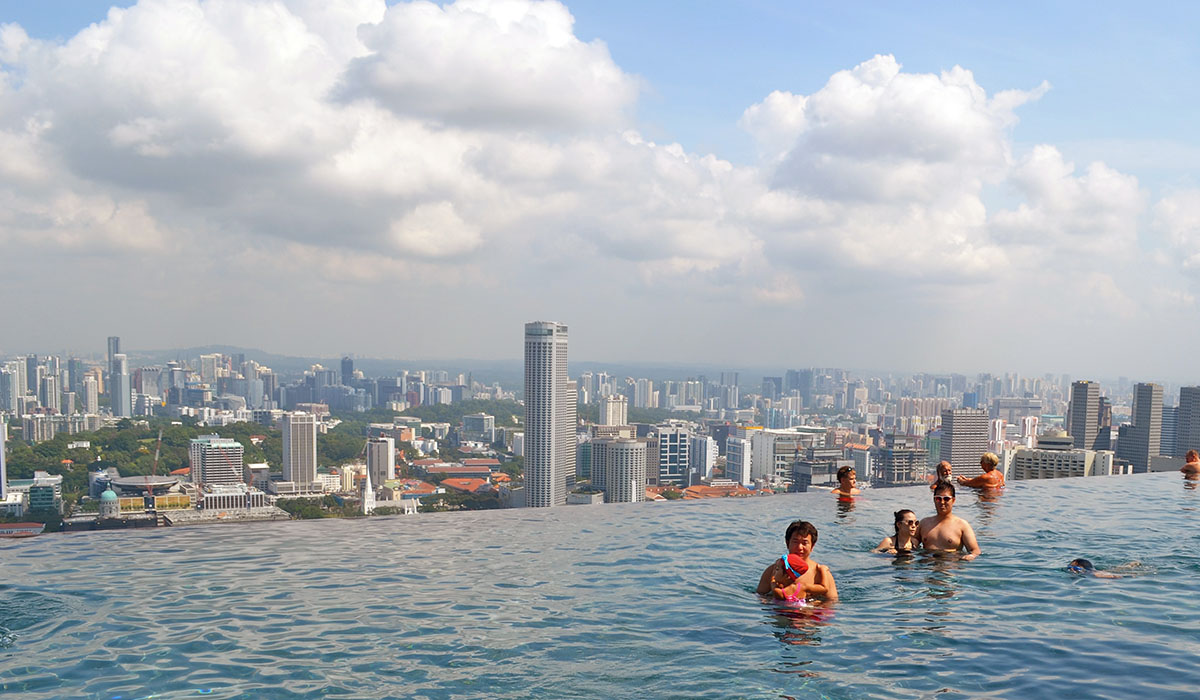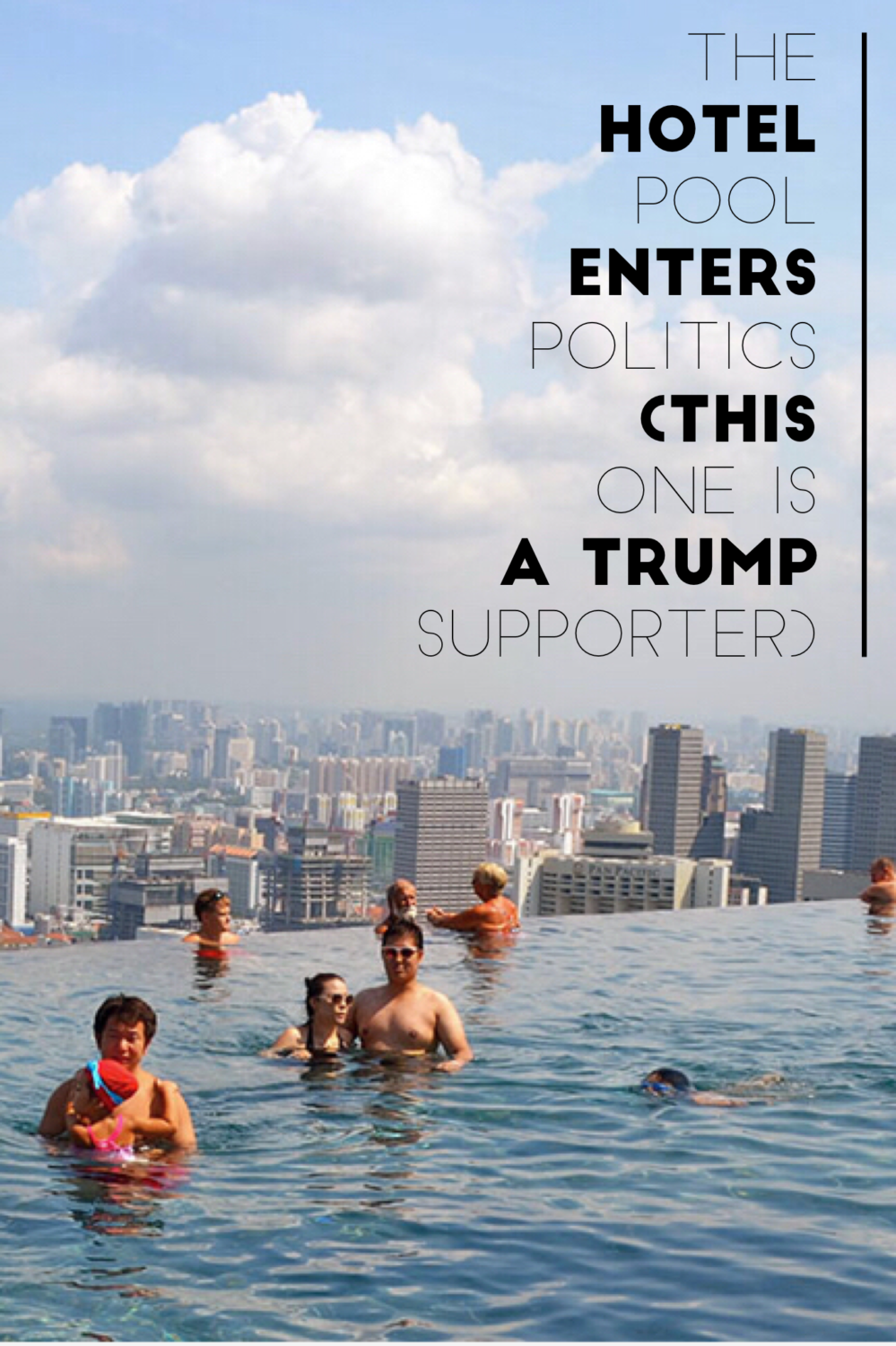Before the plan emerged for me to come here for two weeks, I knew little about Singapore. I had a sense of powerhouse Asian megacities only in the abstract, and my generalizations of them ran toward the overly sterile, overly materialistic, full of suits and really expensive cocktails. I knew Singapore was a fast-paced economic hub, and I knew it boasted some level of multiculturalism. Beyond the abstract, though, what I truly knew about Singapore was that it had the coolest infinity pool I ever did see a photo of, atop of the Marina Bay Sands Hotel and Casino, and that I wanted to jump into it. I didn’t yet know that I wouldn’t in good conscience be able to swim in that pool. (That I turned out liking Singapore far more than I thought I would is another story for another time.)
The pool is an Instagram star, and a worthy one, the most recognizable part of the Sands aside from the building itself. From outside and a medium distance, the Sands is impressive to behold, so much so that it has become an identifying symbol of Singapore, much as the Empire State Building is for New York. The complex consists of three 55-story towers conjoined by a cantilevered platform balanced across their tops. The infinity pool sits on the rooftop platform. At nearly 500 feet long, it’s an engineering feat, for sure.
Some quick internet research revealed that to use the rooftop pool at the Marina Bay Sands, one must stay at the hotel. Which makes sense; despite its fame, this pool is a hotel pool. Rooms were comically expensive, but I felt close to ready to shell out for one night. Then I put it together that of course this Sands, like the one in Macao and like the original one torn down to build the Venetian in Las Vegas, was owned by Sheldon Adelson, the billionaire, Democrat-turned-Republican, and avid Trump supporter.



This reminded me that of the many small daily acts that have become necessarily politicized over the past year, none for me feels more out-of-place than simply entering a hotel. Despite the number of them at which I sleep in a typical year, I haven’t generally given a ton of thought to who owns them, unless the owner is local and of particular interest.
Last summer, that started to change. I developed a grudge toward Marriott when a row of 19th century tenement buildings in the East Village were torn down for no good reason. The bad reason was the Marriot-owned—and quite hideous—Moxy Hotel that would be going up in their place. I wrote about the building demolitions for Flung, and even went to a protest trying to save them. The buildings came down anyway. I’ve been avoiding Marriotts since then, a boycott that will have a statute of limitations, I know, but which feels good for as long as I can muster it.
A couple of months after the Moxy Hotel incident, we as a nation crashed headlong into Election Day, and suddenly the Trump Hotels across the country came into a different light. Before Donald Trump became a politician, it never occurred to me to enter one of his eponymous hotels even for a drink, much less to stay in one. I’ve never had dinner at Jean Gorges, the three-Michelin-star spot in the Trump International Hotel on Central Park—the setting for that awkward dinner last fall between Trump and Mitt Romney—not least because its location inside a Trump hotel struck me as fundamentally tacky. In a sense, then, nothing has changed, except that I think about Trump Hotels all the time now instead of rarely and vaguely. I would never stay in a Trump hotel, now as before, but I am newly fascinated by them.
I walked by the Trump Soho just a couple of weeks ago, on the way to renew my passport for my trip to Singapore, incidentally, and couldn’t resist peering in the lobby. It wasn’t crowded, but it wasn’t completely empty, either. Who are these people? I wondered about that. I wondered more about the doorman. Did they have to pay this worker better now that he stood guard at a hotel owned by the least popular president of modern times, in a city in which only 19 percent of residents voted for him? Was the doorman part of that 19 percent? Or is he mortified to be standing there? Is the money so good he doesn’t care? Does he notice people like me stealing glances at him, trying to size him up? Is he uniquely tempered to deal with those who might take their anger at the state of the country out on a building?
I thought a lot about Trump this past spring when I spent a night in Atlantic City, as well. How could I not when shuttered Trump casinos literally dot the landscape. Trump is a failed casino magnate. Sheldon Adelson, by contrast, is a very successful casino magnate. Adelson saw in Trump a genius CEO who could use business tactics to save the country. I don’t know why he didn’t see the difference between himself, a self-made billionaire, and Trump, a billionaire despite what seems like his best efforts not to be, and also a billionaire who might not actually be a billionaire.
At any rate, of all the daily newspapers in the United States (even still!), the only one to endorse Donald Trump for present was the Las Vegas Review-Journal, owned by Adelson. Adelson contributed $25 million to Trump’s campaign, more by far than any other individual. He donated another $5 million to Trump’s inauguration. A stay at any Adelson-owned hotel feeds his ability to take such action again in the future.
One friend, when I complained about my moral obligation to eschew the Sands, suggested I go there, order a drink, and “accidentally” break a glass. I told my fella we should go gamble there on the condition that we make sure to win, thus extracting some capital from the Las Vegas Sands Organization. Neither seemed particularly workable as a means to justify getting at that pool.
I realize that Sheldon Adelson is worth $34.8 billion, and the $400 I won’t be spending on a room at the Marina Bay Sands really does nothing to diminish that fortune (or, ahem, the $400 worth of accumulated points on my Chase card I won’t be spending). I could have rationalized booking the room. I didn’t as a symbol for myself more than anything. Small gestures are important in a world that feels as though it’s reeling ever further of control. Every once in a while, small gestures accumulate into something bigger.
One night after a stroll through the adjacent Gardens by the Bay in Singapore, I walked through the Sands. My fella needed a restroom and the Sands provided one. So thanks for that Sheldon, I guess. To get from the Gardens into the Sands was not a simple task. To get into the place, we had to walk over a major highway on a pedestrian bridge, then through what I think was the hotel lobby—although we were still on a bridge and could not have accessed said lobby had we wanted to—then across an outdoor plaza and finally, down an escalator into the belly of the beast.
The Sands complex includes not just a 2,500-room monstrosity of a hotel and casino, but also a garish shopping mall that seemed by turns full of typical western tourists, with their bad t-shirts and Tevas, and young Asian tourists dressed for the club, which the Sands also features. You’ll find restaurants by seven different celebrity chefs, all of them male, plus more additional restaurants, lounges and bars than I care to keep track of, and two theaters. Every surface was shiny. Down below, replica traditional Chinese boats lulled on an indoor canal. For $10 SGD, you can take a ride on a boat through the mall, never leaving the mall and arriving to the mall when you’re done. I hated it. I no longer even wanted to see the pool. We bee-lined for the taxi stand.
Feature Image by Sarah Ackerman via Wikimedia Commons.







